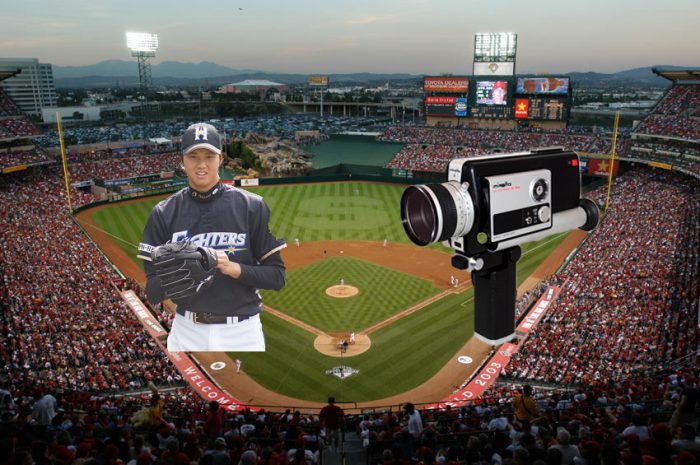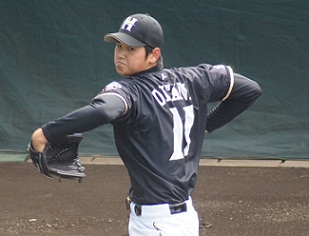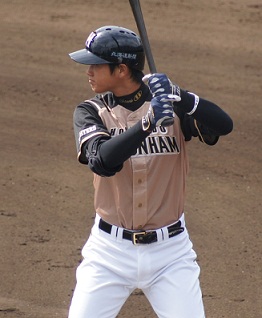
What can filmmakers learn from Shohei Ohtani?
Baseball fans will no doubt be following Shohei Ohtani’s career in the Majors very closely. For those out of the Japanese news loop, he is a headline-grabbing baseball player who has just moved from the Japanese league’s Nippon Ham Fighters to the United States’s Los Angeles Angels where he is cementing his status as a national hero. The first true two-way player since Babe Ruth, he could do what the Bambino couldn’t and play both positions for his entire career. Leaving aside the stats and all the history behind his legendary status, what lessons can filmmakers learn from the famously reclusive Japanese sporting hero?
Determination
Ohtani clearly believes in himself. As a high school student, he wrote down his hopes and dreams with strong conviction: “I will become a champion”, “I will set a new Japanese fastest pitch record by throwing 163km/h” and “I will be selected by eight teams as their number one draft pick”. No “I hope to be,” no “I aspire to”. As Yoda says, “Do. Or do not. There is no try.” This is the attitude filmmakers should have, too. The likes of Robert Rodriguez advise us to not label ourselves as ‘aspiring’ but to own the title of ‘filmmaker’ if we make films.
 Furthermore, Ohtani has bounced back from a rough pre-season, where he posted a 27.00 ERA over 2.2 innings pitched, plus a batting average of .125 getting four hits in 32 at-bats in exhibition games. For those unfamiliar with baseball, these are atrocious numbers. Pundits and scouts began to slate him, comparing him to an undeveloped high school player. Once the regular season started however, things turned right around. At the time of writing this article, he is batting .367 (very good) and has had two very good starts as a pitcher (plus one rough one thanks to a blister). What is clear is that the public bashing he received during the preseason did not affect his regular-season performance, and we can assume based on this that his one bad start on the mound this week will also not have long-term repercussions.
Furthermore, Ohtani has bounced back from a rough pre-season, where he posted a 27.00 ERA over 2.2 innings pitched, plus a batting average of .125 getting four hits in 32 at-bats in exhibition games. For those unfamiliar with baseball, these are atrocious numbers. Pundits and scouts began to slate him, comparing him to an undeveloped high school player. Once the regular season started however, things turned right around. At the time of writing this article, he is batting .367 (very good) and has had two very good starts as a pitcher (plus one rough one thanks to a blister). What is clear is that the public bashing he received during the preseason did not affect his regular-season performance, and we can assume based on this that his one bad start on the mound this week will also not have long-term repercussions.
It is important for filmmakers to learn to bounce back like this too, as our industry finds us constantly faced with rejection on various levels. From a producer passing on your script, to more mundane day-to-day rejections like an actor you wish to work with not being available or a festival rejecting your film. And at some point you will (hopefully) be in the enviable position of receiving criticism and reviews, both good and bad. Just like Ohtani is so able to leave the past behind him, filmmakers must concentrate on the present and future, rather than dwelling on rejections and mistakes.
Discipline
 For all his self-conviction, Ohtani is undeniably humble. Rather than focusing on his own in-game successes, he stresses in interviews his pleasure at the team as a whole achieving wins, and his gratitude to every fan in the stadium. Early comments from coaches and teammates when he first joined the Angels centred on his attitude and hard-working nature. Just like baseball, filmmaking is a team sport, and ensuring you have a good rapport with your whole team is essential.
For all his self-conviction, Ohtani is undeniably humble. Rather than focusing on his own in-game successes, he stresses in interviews his pleasure at the team as a whole achieving wins, and his gratitude to every fan in the stadium. Early comments from coaches and teammates when he first joined the Angels centred on his attitude and hard-working nature. Just like baseball, filmmaking is a team sport, and ensuring you have a good rapport with your whole team is essential.
On top of this, Ohtani does not go out. He does not drink. He does not drive. He does not even spend any money. At least, he doesn’t spend money on luxuries — it is said that he has his salary paid to his parents, who in turn transfer him just ¥100,000 (approx. $1,000) spending money every month. Of this ¥100,000 he apparently only spends ¥10,000. Any spare time, he spends practising baseball. Now I am not advocating becoming ascetic filmmakers, hiding away and obsessively perfecting our craft. Particularly as the best filmmakers have life experience: Stanley Kubrick was a photographer, Ava DuVernay was a journalist, Marielle Heller was a waiter for twelve years; so on and so forth. Nevertheless we should be more willing to embrace Ohtani’s approach to life. We must examine our priorities and spend less on luxuries and more on actually making our films.
Diversity
Beyond determination and discipline, Ohtani has a large array of skills at his disposal. He can both bat and pitch, which makes him unique as a baseball player and doubles his opportunities for success. This is particularly the case for filmmakers in the world we live in today, where many directors have previous careers as crew and heads of departments. For example, Jeremy Saulnier was primarily a cinematographer until he made Blue Ruin (2013). DoP Reed Morano is now a director too. Again, this advice should be taken with caution. It probably mostly applies to directors, and it is probably not a good application of time for, say, a cinematographer to also train as a costume designer. The real takeaway should be that it is important for directors to experience a variety of positions, to at least gain an understanding and empathy for what other members of the creative team do. For more on this, check out Noam Kroll’s excellent piece on developing a range of skills without spreading oneself too thin.
Conclusion
There are many lessons to be learned from Ohtani’s lifestyle, which no doubt is also why sports movies are still so popular. The idea of a determined hero working with discipline towards the tangible goal of being the best in the world has strong universal narrative appeal. Of course, having self-belief, determination and a broad skillset is useful for anyone in any industry, not just sports and filmmaking. And to an extent, Ohtani’s natural talent must play a part in this (he threw 110km/h in elementary school), but it is argued time and time again by scientists and psychologists that hard work plays as large a role in sporting success. The same can be said about filmmaking.
Mutants
In keeping with the baseball theme but going far, far away from Ohtani’s straight-laced image, check out Mutants (2016), Alexandre Dostie’s very NSFW, very unglamorous coming-of-age baseball drama. At just under seventeen minute, it may be a little on the long side, and it has its flaws, but is well worth a watch for filmmakers. The character and world-building is the film’s real strength, presenting us with a range of abject anti-heroes whom we are able to know everything about by the end of the first minute.
